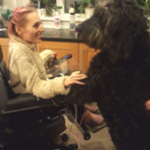Teenagers (13-17 years) Social Life
Teenagers (13-17 years) Social Life
Last reviewed: July 2024
Last addition: January 2025
Find out about the assessment process, what adaptations are possible and all the key stages that could lead to you driving your own car.
You will find information on:
- Plane Travel
- A-Z of Other Transport
In the Adult’s section
Mia, Ellia and Sophie talk about Fashion, Make-up and Confidence:
Recorded: August 2021
A daily chore you hate or something you love? There’s no end of advice out there on skin care, hair care, fashion, make-up, latest looks. You name it, someone’s on YouTube or a blog telling you what they think and giving you ideas to try. We’re not out to compete!
If we get any tips and advice from people who have found it challenging to find fashionable clothes or footwear or struggled to put on make-up, we pop them in here. If you have found solutions that work for you, please share your tips, advice and photos.
Tips from our What’s App groups
Recommendations include:
- Able2Wear >
- Rackety’s > range sold by Fledglings Contact not for profit shop to support the charity
- Friendly Shoes >
- BILLY Footwear> range sold by Fledglings
If you are having difficulty keeping your feet warm, have a look at the shop at:
You may also find other virtual groups and networks on Facebook, WhatsApp and Instagram. We have listed a number of these on our Online Communities page.
You can listen to, watch or read what young people, adults and others have to say in Community Voices as well as our Living With SMA podcasts – like the one below.
Maxwell chats to Luis about his life with SMA:
Recorded August 2022
Assistance dogs are popular with many families and adults in the SMA Community. An assistance dog could help you with practical tasks such as:
- picking up dropped items like your mobile, or remote control
- opening and closing doors
- helping with dressing and undressing
- helping with physiotherapy routines
- pressing the button at a pedestrian crossing
- reaching up to shop counters.
This can mean that you are less reliant on other people for some of your day-to-day activities.
If you are in charge of your working dog’s care and training, it could also help you increase your confidence – though you may not need this! As with many dogs, it will also provide loyal and unconditional friendship and company.
Dogs are also a great ice breaker and way of meeting and talking to people when you are out and about. Registered assistance dogs should be allowed to go with their owner into many public places, such as shops, restaurants and to travel on public transport.
There is however a ‘but’, which is that an assistance dog is a serious commitment that needs a lot of thought and planning.
If you are interested, there are several organisations that can give advice. Some train and provide their own dogs; others provide training for people who already have a pet dog. Each organisation has its own eligibility criteria, application process and training schemes. They can also give information and advice about the responsibilities of dog owners:
- Assistance Dogs UK
- Dog AID
- Dogs for Good (formerly Dogs for the Disabled)
- Support Dogs
Animal Companions
You may decide that you don’t want an assistance dog. A well trained family dog can be a great addition and companion:
Sunny Every Day
In March 2018, Martyn and his fiancée, Kasia, got their dog Sunny – find out why they decided to go for it and what Sunny means to them.
 Marni – with Dylan the Goldendoodle & Buttercup the Chihuahua
Marni – with Dylan the Goldendoodle & Buttercup the Chihuahua
Marni, who has SMA Type 2, shares what Dylan and Buttercup mean to her.
 Ross & Ralph
Ross & Ralph
Ross, who has SMA Type 2, introduces his golden cockapoo called Ralph!
Your SMA may mean you and your family need to do some extra thinking when it comes to planning a holiday. You may also be interested in some sort of adventure break with other young people. For planning tips and ideas of where to go see
If you use a wheelchair, you know some places are not really accessible. Knowing where to find an accessible loo, for example, can make a big difference to a day out. If you don’t usually use a wheelchair but you get tired when you are out and about, speak to your physio or OT. Ask them if and when it might be helpful to start using one sometimes. One might be useful for days out at big venues. They should tell you how to go about getting one.
Tips and ideas from our What’s App Groups:
July 2024: some people are signing up for an Access Card which costs £15 for 3 years. It is a photo ID that can be used to easily communicate your access requirements to events and venues. It also works online with other platforms like ticketing systems, to unlock the access facilities you need.
Accessaloo App – uploaded and rated by users worldwide.
Changing Places toilets provide a height adjustable changing bench with hoist and plenty of space. Visit their website for more information and a map of where Changing Places can be found.
The National Key Scheme for accessible toilets that can be found in shopping centres, cafes, department stores and in bus and train stations around the country. To unlock the toilets, you’ll need to buy a RADAR key.
ToiletMap – Great British Toilet Map gives opening hours and locations – use the filter to find accessible toilets.
For actual days out, these websites are full of tips and ideas:
AccessAble – access information for over 120,000 places of interest in the UK
Accessible Boating – charity offering day trips on an accessible boat.
CanalAbility – charity offering accessible canal boat day trips
Cinema Trips can be much cheaper with a CEA Card (Cinema Exhibitors’ Association Card). This works nationally entitling anyone age 8 years and over to one free ticket for a person accompanying them. To apply, your child will need to be receiving Disability Living Allowance (DLA), The card currently costs £6.00 a year.
Euan’s Guide – access reviews from disabled people and their friends and families. Covers tourism and entertainment venues as well as post offices, supermarkets and railway stations.
Kids Days Out – child friendly activities across Britain and whether they are wheelchair accessible throughout.
National Trust Accessibility Guide.
Sandcastle Trust – offers bespoke family respite, wrap around fun family engagement activities and peer support to support families living with a rare genetic condition (based on their individual needs) from across the UK.
Seagull Trust (Scotland) – a charitable organisation, wholly run by unpaid volunteers, providing free barge trips for people with special needs. They have fully accessible boats suitable for wheelchairs.
The Rough Guide to Accessible Britain includes accessibility information, including disabled parking and reviews, hints and tips written by disabled visitors.
